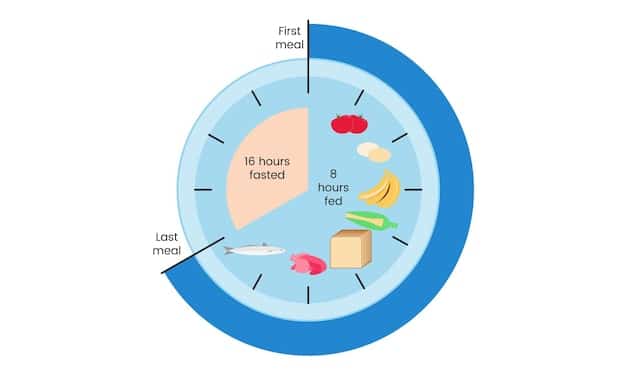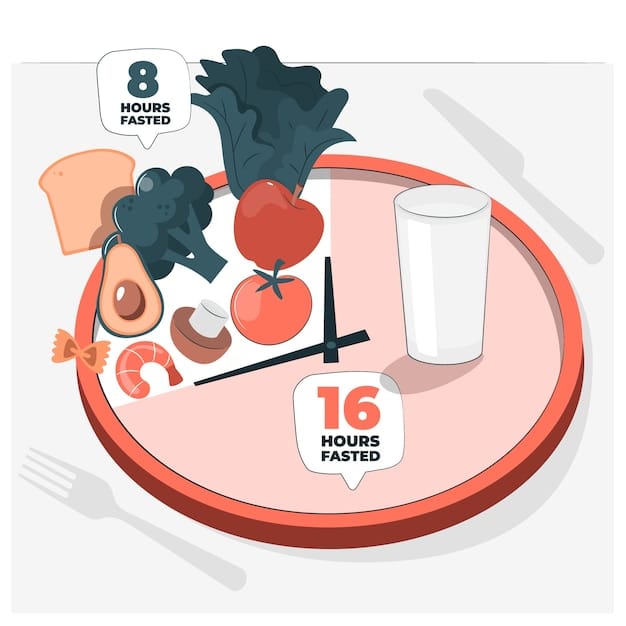Intermittent Fasting: Latest Research on Weight Loss and Longevity

The latest research on intermittent fasting reveals promising evidence for weight loss, improved metabolic health, and potential longevity benefits, although the effectiveness and safety can vary depending on the specific fasting protocol and individual health conditions.
Interested in the latest research on intermittent fasting: can it really help you lose weight and live longer? This article provides a comprehensive overview of its benefits, potential risks, and practical tips for incorporating it into your lifestyle.
Understanding Intermittent Fasting: A Comprehensive Overview
Intermittent fasting (IF) has gained immense popularity as a dietary strategy not only for weight loss but also for its potential health benefits. Unlike traditional diets that focus on what to eat, intermittent fasting revolves around when you eat.
This section delves into the fundamental aspects of intermittent fasting, exploring what it is, how it works, and the various methods available.
What is Intermittent Fasting?
Intermittent fasting is an eating pattern that cycles between periods of eating and voluntary fasting on a regular schedule. It’s not a diet in the conventional sense, but rather a timing protocol that dictates when you should eat.
How Does Intermittent Fasting Work?
During periods of fasting, your body undergoes several metabolic changes. One of the primary effects is a shift from using glucose (sugar) as the primary energy source to burning stored fat.
- Ketosis: Prolonged fasting can lead to ketosis, a state where the body produces ketones from fat breakdown to use as fuel.
- Cellular Repair: Fasting triggers cellular repair processes, such as autophagy, where the body removes damaged cells.
- Hormone Regulation: IF can improve insulin sensitivity and regulate hormones like growth hormone, which may have anti-aging effects.
These physiological changes are believed to contribute to the potential benefits of intermittent fasting.
In summary, intermittent fasting is a flexible eating pattern that can be adapted to fit your lifestyle. It offers potential health benefits, including weight loss, improved metabolic health, and cellular repair, making it a compelling option for those seeking to optimize their well-being.
The Science Behind Weight Loss with Intermittent Fasting
One of the primary reasons people turn to intermittent fasting is for weight loss. But how exactly does it facilitate weight reduction? Understanding the science behind this process can help you make informed decisions about incorporating IF into your routine.
This section explores the scientific mechanisms through which intermittent fasting promotes weight loss, including calorie restriction, hormone regulation, and metabolic shifts.
Intermittent Fasting and Calorie Restriction
Intermittent fasting often leads to automatic calorie restriction. By limiting the window of time in which you eat, you may naturally consume fewer calories. This is because you have less time to eat and may find it easier to control your appetite.
Hormone Regulation
Intermittent fasting has been shown to impact several hormones that play a crucial role in weight management:
- Insulin: IF can reduce insulin resistance, allowing your body to use insulin more efficiently and preventing excess glucose from being stored as fat.
- Growth Hormone: Fasting can increase growth hormone levels, which can help preserve muscle mass while burning fat.
- Norepinephrine: During fasting, your body releases norepinephrine, a hormone that helps break down fat and increase energy expenditure.

These hormonal changes work together to support weight loss and overall metabolic health.
To conclude, the science behind weight loss with intermittent fasting involves a combination of calorie restriction and hormonal regulation. By understanding these mechanisms, you can optimize your approach to IF and achieve your weight loss goals effectively.
Longevity and Intermittent Fasting: What the Research Says
Beyond weight loss, many are drawn to intermittent fasting for its potential to extend lifespan and promote healthy aging. Research in this area is ongoing, but early findings suggest that IF may indeed have a positive impact on longevity.
This section examines the scientific evidence linking intermittent fasting to longevity, exploring mechanisms such as cellular repair, reduced inflammation, and improved metabolic health.
Cellular Repair Processes
One of the key ways intermittent fasting may promote longevity is through the activation of cellular repair processes, particularly autophagy. Autophagy is the body’s way of cleaning out damaged cells, recycling cellular components, and preventing the accumulation of dysfunctional proteins.
Reduced Inflammation
Chronic inflammation is a major contributor to age-related diseases, such as heart disease, cancer, and Alzheimer’s disease. Intermittent fasting has been shown to reduce inflammation by modulating the immune system and decreasing the production of inflammatory molecules.
The potential health benefits of intermittent fasting on longevity are promising, but more research is needed to fully understand the long-term effects on humans. However, the available evidence suggests that IF may be a valuable tool for promoting healthy aging and extending lifespan.
Different Methods of Intermittent Fasting: Choosing the Right One for You
Intermittent fasting is not a one-size-fits-all approach. There are several methods to choose from, each with its own set of guidelines and potential benefits. Understanding these methods can help you select the one that best suits your lifestyle and goals.
This section provides an overview of the most popular intermittent fasting methods, including the 16/8 method, the 5:2 diet, and alternate-day fasting, along with their pros and cons.
The 16/8 Method
The 16/8 method, also known as the Leangains protocol, involves fasting for 16 hours each day and restricting your eating window to 8 hours. For example, you might eat between noon and 8 PM and then fast for the remaining 16 hours.
The 5:2 Diet
The 5:2 diet involves eating normally for five days of the week and restricting your calorie intake to around 500-600 calories on the other two days. These two days can be non-consecutive.

Alternate-Day Fasting
Alternate-day fasting involves alternating between days of normal eating and days of complete or modified fasting. On fasting days, you may consume little to no calories.
- Choose Based on Lifestyle: Consider your schedule and preferences when selecting a method.
- Start Gradually: If you’re new to IF, start with a less restrictive method like the 16/8 method.
- Monitor Your Body: Pay attention to how your body responds and adjust your approach accordingly.
Selecting the right method involves understanding your personal preferences, lifestyle, and health goals. Experiment with different approaches to find what works best for you and consult with a healthcare professional if needed to ensure safety and effectiveness.
Potential Risks and Side Effects of Intermittent Fasting
While intermittent fasting offers numerous potential benefits, it’s not without potential risks and side effects. Understanding these downsides can help you implement IF safely and avoid potential health complications.
This section examines the possible risks and side effects of intermittent fasting, including nutrient deficiencies, hormonal imbalances, and psychological effects, along with tips on how to minimize these risks.
Nutrient Deficiencies
If not carefully planned, intermittent fasting can lead to nutrient deficiencies. Restricting your eating window may make it challenging to consume all the essential vitamins and minerals your body needs.
Hormonal Imbalances
In some individuals, intermittent fasting may disrupt hormonal balance, particularly in women. It can affect menstrual cycles and thyroid function.
Psychological Effects
For some people, intermittent fasting can lead to psychological issues such as increased stress, anxiety, and disordered eating behaviors.
While intermittent fasting can be a valuable tool for improving health, it’s essential to be aware of the potential risks and side effects. By planning your meals carefully, staying hydrated, and monitoring your body’s response, you can minimize these risks and enjoy the benefits of IF safely. Always consult with a healthcare professional before starting any new dietary regimen, especially if you have underlying health conditions.
Practical Tips for Incorporating Intermittent Fasting into Your Lifestyle
Starting intermittent fasting can feel daunting, but with the right approach, it can be seamlessly integrated into your daily routine. Strategic planning and a mindful approach are key to long-term success.
This section provides practical tips for safely and effectively incorporating intermittent fasting into your lifestyle, including meal planning, hydration strategies, and how to address common challenges.
Meal Planning
Planning your meals in advance is crucial for ensuring you get all the nutrients you need during your eating window. Focus on nutrient-dense foods such as fruits, vegetables, lean proteins, and whole grains.
Hydration Strategies
Staying hydrated is especially important during fasting periods. Drink plenty of water, herbal teas, and other calorie-free beverages to keep your body functioning optimally.
Addressing Common Challenges
Common challenges of intermittent fasting include hunger, fatigue, and difficulty concentrating. These can be addressed by gradually easing into IF, staying hydrated, and ensuring you’re getting enough electrolytes.
Incorporating intermittent fasting into your lifestyle requires careful planning, mindful execution, and a willingness to adapt. By following these practical tips, you can successfully integrate IF into your routine and experience its potential health benefits.
| Key Point | Brief Description |
|---|---|
| ⏰ Method Variety | Includes 16/8, 5:2 diet, alternate-day fasting; choose one that fits your lifestyle. |
| 💧 Hydration | Drink plenty of water, herbal teas to stay hydrated during fasting periods. |
| ⚖️ Weight Loss | Promotes weight loss through calorie restriction and hormone regulation. |
| 🌱 Nutrient-Dense Meals | Focus on fruits, vegetables, lean proteins, and whole grains during the eating window. |
Frequently Asked Questions
▼
Intermittent fasting isn’t safe for everyone; pregnant women, individuals with eating disorders, and those with certain medical conditions should consult a healthcare provider first.
▼
Yes, you can exercise while intermittent fasting. It’s often recommended to exercise during your eating window to provide your body with the necessary energy.
▼
Results vary depending on the individual, method used, and consistency. Some may see changes in a few weeks, while others may take longer to notice significant effects.
▼
During fasting periods, you can drink water, black coffee, unsweetened tea, and other calorie-free beverages to stay hydrated without breaking your fast.
▼
If not done correctly, intermittent fasting can lead to muscle loss. Consuming enough protein during eating windows alongside resistance exercise can help mitigate this.
Conclusion
In conclusion, the latest research on intermittent fasting suggests it can be a valuable tool for weight loss and potentially improve longevity. However, it is important to approach it with caution, considering individual health conditions and consulting with healthcare professionals to ensure safety and effectiveness.





